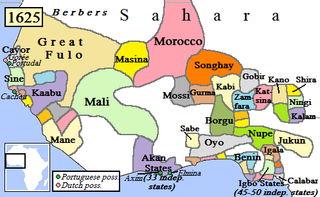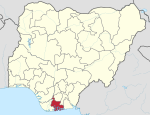Ihiala is a city in Nigeria, located in the southern part of Anambra State and within the region known as Igboland. It has long served as the local administrative capital of Ihiala Local Government Area. The Local Government Area has a population of about 430,800.

Bonny is a traditional, coastal town and a Local Government Area (LGA) in Rivers State in Southern Nigeria, on the Bight of Bonny. It is also the capital of the Kingdom of Bonny.
The Eleme people are one of the various groups of indigenous peoples that inhabit the Niger Delta region of South-South Nigeria.
Onne, also known as Onne-Eleme, is a town in Eleme, Rivers State, Nigeria. The town is a host to one of the two prominent ports in Nigeria. It is bordered by the towns of Alode, Ebubu, and the Ngololo River, which is one of the tributaries of the Bonny River.
Nnewi North is a Local Government Area in Anambra State, south-central Nigeria. Nnewi is the only town in Nnewi North LGA. It has four villages (sub-towns) that make up the one-town local government, which includes; Otolo, Uruagu, Umudim and Nnewi-ichi. The traditional ruler of Nnewi- Igwe of Nnewi -presently is Igwe Kenneth Orizu the 3rd of which this royal family is from Otolo Nnewi, and for this reason, is regarded as first among equals of the four villages. Other traditional rulers exist in other villages and they oversee the traditional affairs of their respective villages, amongst which are Obi Nnamdi AC Obi (ogidi) who is obi of Uruagu, Obi Umudim And obi Onyekaba Of Nnewichi. In this vein one may ask who is now Obi of Otolo since the royal family of Igwe oversees the traditional affairs of entire nnewi.

The Nigerian Ports Authority (NPA) is a federal government agency that governs and operates the ports of Nigeria. The major ports controlled by the NPA include: the Lagos Port Complex and Tin Can Island Port in Lagos; Calabar Port, Delta Port, Rivers Port at Port Harcourt, and Onne Port. Operations of the NPA are carried out in affiliation with the Presidency of (Nigeria) and the Nigerian Shippers' Council. The Head office of the Nigerian Ports Authority is located in Marina, Lagos.
Opobo/Nkoro is a Local Government Area in Rivers State, Nigeria. It is part of the Andoni/Gokana/Khana/Oyigbo/Tai/Eleme constituency of the Nigerian National Assembly delegation from Rivers. The capital of Opobo/Nkoro is Opobo Town.
Oyigbo also known as Obigbo is a Local Government Area located in Rivers State, Nigeria. It is a town, 30 kilometers from the Port city of Port Harcourt, 25km from the city of Aba. It's predominantly inhabited by the Asa people an indigenous Igbo people who are also found in Ukwa west L.G.A in Abia state and the Ndoki people who are also found in Ukwa East L.G.A of Abia state and Ukanafun L.G.A of Akwa ibom state
Tai is a Local Government Area (LGA) of Rivers State in Nigeria. It covers an area of 159 km2 and at the 2006 Census it had a population of 117,797. It is part of the Okrika/Oyigbo/Tai/Eleme constituency of the Nigerian Senate, represented since April 2007 by George Thompson Sekibo. Tai local government headquarters is situated at Sakpenwa. Christianity and traditionalism are widely practiced in the area and little Islamic religion In the April 2007 elections the Tai LGA recorded an implausible 99.6% turnout for the Governorship election. Celestine Omehia of the Rivers State People's Democratic Party was at first declared winner, but his election was later annulled and Rotimi Amaechi, also of the PDP, was declared governor. In February 2009, the Chairman of Tai Local Government Area was Barry Mpigi.
Numan, also known as Nomweh, is a town and a Local Government Area in Adamawa State, Nigeria. It is a port town that lies on the confluence of Benue River and Gongola River.
Kaura is a town and a Local Government Area in southern Kaduna State, Nigeria. Its headquarters are in the town of Kaura in Asholyio (Moroa) Chiefdom. The Local Government Council is chaired by Matthias Siman. Other towns include: Manchok and Kagoro. It has an area of 461 km2 and a population of 174,626 at the 2006 census. The postal code of the area is 801.

Egbeda is a Local Government Area in the senatorial district of Oyo central in Ibadan less city of Oyo State, Nigeria. Its headquarters are in the town of Egbeda. Egbeda local government was carved out Lagelu Local government in 1989. The postal code of the area is 200109
Ogu–Bolo is a local government area (LGA) in Rivers State, Nigeria with headquarters in the town of Ogu. It is located on the Eastern Niger Delta.
Khana is a Local Government Area located in the South-East senatorial district of Rivers State, Nigeria. Its administrative seat is in the town of Bori.

Nigerian traditional rulers often derive their titles from the rulers of independent states or communities that existed before the formation of modern Nigeria. Although they do not have formal political power, in many cases they continue to command respect from their people and have considerable influence in their community.
Eleme is a language spoken by Eleme people in the Niger Delta Region of Nigeria. Eleme is a Niger-Congo language spoken by approximately 40-50,000 speakers in Rivers State in southeast Nigeria. It belongs to the Ogonoid language group, within the Cross River branch of Benue-Congo. Eleme language was originally divided into two mutual dialects of Nchia and Odido. Nchia spoken in six communities of Agbonchia, Akpajo, Alesa, Aleto, Alode and Ogale, while Odido dialect was spoken at Ebubu, Ekporo, Eteo and Onne, today, both dialects have submerged, with a few varying pronunciations.
Ndowa N Lale is a Nigerian academic and publisher. He is the 8th substantive Vice-Chancellor of the University of Port Harcourt in Rivers state, Nigeria.

Imelda Icheji Lawrence Udoh is a Professor of Linguistics and Nigerian Languages of the Faculty of Arts, University of Uyo, Nigeria. She serves as the President of the Linguistic Association of Nigeria (LAN). She is also a life member and Fellow of the Nigerian Academy of Letters. She is a DAAD alumnus and has served as Head of Department of Linguistics and Nigerian Languages from 2010 to 2014, as Vice Dean of the Faculty of Arts from 2010 to 2013, and Deputy Director, School of Continuing Education (2015–2016) of the University. She noted in her research that "Nigerian local languages seem to appear dying in particular areas, but still flourishing in others". Udoh advocated for the protection of these indigenous languages while delivering the 81st Inaugural Lecture of the University of Uyo. Udoh is also a Member of Council of the West African Linguistic Society. A festschrift was organized in her honour in 2019.

Philip Osaro Obele is a Nigerian traditional ruler and eleventh Oneh Eh Eleme of Eleme Kingdom since 2019.









